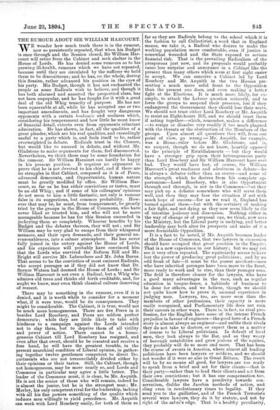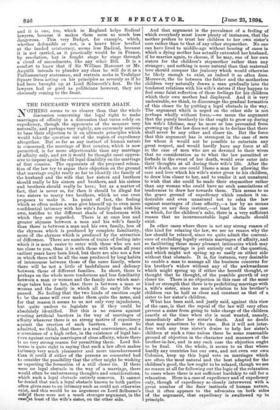THE RUMOUR ABOUT SIR WILLIAM HARCOURT.
WE wonder how much truth there is in the rumour, now so persistently repeated, that when his Budget is once through and the Session closed, Sir William Har- court will retire from the Cabinet and. seek shelter in the House of Lords. He has denied some rumours as to his growing ill-health, rumours which we have not repeated, because until they are circulated by the sufferer we hold them to be discourteous; and he has, on the whole, during this Session, rather advanced his position in the eyes of his party. His Budget, though it has not enchanted the people as some Radicals wish to believe, and though it has both alarmed and annoyed the propertied class, has not been unpopular, and he has fought for it with a. good deal of the old Whig tenacity of purpose. He has not been squeezable at all, while he has accepted one or two important amendments, and has fought very dangerous opponents with a certain bonhomie and coolness which, considering his temperament and how little he must know of financial detail, extorts even from opponents reluctant admiration. He has shown, in fact, all the qualities of a great pleader, which are his real qualities, and exceedingly useful to a party which is, and feels itself to be, rather- overweighted in debate. Radicals trust in the Closure, but would like to succeed in debate, and without Mr.
Gladstone to make arguments for them, feel disconcerted.
Nevertheless, we think there may be some foundation for the rumour. Sir William Harcourt can hardly be happy in his present position. It requires no argument to prove that he is not devoted to his chief, and if there are no struggles in that Cabinet, composed as it is of Peers, advanced democrats, and Opportunists, human nature must be greatly modified by office. Sir William Har- court, so far as he has either convictions or tastes, must be an old Whig ; and if some of his colleagues' opinions do not seem to him a little fantastic, not only is rumour false in its suggestions, but common probability. How- ever that may be, he must, from temperament, be greatly tried by the groups in the House of Commons, who have never liked or trusted him, and who will not be more manageable because he has for this Session succeeded in jockeying them so completely. Whoever benefits by his Budget and the debates thereon, they will not ; and Sir William may be very glad to escape from their whispered menaces, and their open demands, and their general un- reasonableness, into a calmer atmosphere. He has never fully joined in the outcry against the House of Lords, and his experience will probably have convinced him that the Lords who survived the Reform Bill and Mr.
Bright will survive Mr. Labouchere and Mr. John Burns. That seems to be the conviction of most eminent Radicals, who accept peerages as if they did not know that Dr. Spence Watson had doomed the House of Lords ; and Sir William Harcourt is not even a Radical, but a Whig who admires old trees and thinks old birth creditable, and, for aught we know, may even think classical culture deserving of respect.
There may be something in the rumour, even if it is denied, and it is worth while to consider for a moment what, if it were true, would be its consequences. They might be considerable. The Cabinet, it is true, would not be much more homogeneous. There are five Peers in it besides Lord Rosebery, and Peers are seldom perfect democrats ; while they are little likely to take with kindness to a campaign against the Lords intended not to slay them, but to deprive them of all virility and power of action. There cannot be a homo- geneous Cabinet till Lord Rosebery has resigned, and even after that event, should he be reseated and receive a free hand, he will have the greatest trouble, in the present anarchical condition of Liberal opinion, in gather- ing together twelve gentlemen competent to direct De- partments who are not irreconcilably divided either by their opinions or their tastes. Still, the Cabinet, though not homogeneous, may be more nearly so, and Lords and Commons in particular may agree a, little better. The leader of the Commons must, it is clear, be Mr. Asquith. He is not the senior of those who will remain, indeed he is almost the juniqr, but he is the strongest man ; Mr. Morley, his only competent rival for the leadership, lacking with all his fine powers something of the quality which induces men willingly to yield precedence. Mr. Asquith can work with Lord Rosebery easily, for both of them so far as they are Radicals belong to the school which it is the fashion to call Collectivist, a word that in England means, we take it, a Radical who desires to make the working population more comfortable, even if justice is somewhat wounded and the State exposed to serious financial risk. That is the prevailing Radicalism of the prosperous just now, and its proposals would probably cause less surprise and annoyance in a Cabinet like the present than many others which seem at first sight easier to accept. We can conceive a Cabinet led by Lord Rosebery and Mr. Asquith in the two Houses pre- senting a much more solid front to the Opposition than the present one does, and even making a better fight at the Elections. It is much more likely, for ex- ample, to attack the Labour question seriously, and to force the groups to suspend their pressure, lest if they endangered the Government they should lose their seats. We should not trust either Lord Rosebery or Mr. Asquith to resist an Eight-hours Bill, and we should trust them if acting together—which, remember, makes a difference —to resign or dissolve very readily if too much plagued with the threats or the obstruction of the Members of the groups. Upon almost all questions they will, from our point of view, go wrong — Mr. Asquith, for example, was a Home-ruler before Mr. Gladstone, and is, we suspect, though we do not know, heartily opposed to the principle of Establishments — but they would have a stronger grip upon their heterogeneous party than Lord Rosebery and Sir William Harcourt have ever had. They would have lost, of course, Sir William Harcourt's great readiness and adroitness in debate—he is always a debater rather than an orator—and some of the strength which he derives from his complete op- portunism—Lord Rosebery, who is also Opportunist through and through, is not in the Commons—but they may pick up a debater somewhere who will serve them well, and then they may face the situation if not with much hope of success—for as we read it, England has turned against them—but with the certainty of making a fair fight, and not dying as they now seem likely to die of intestine jealousy and dissension. Nothing either in the way of change or of proposal can, we think, now save the Ministry, but the Liberal party is undying, and better leadership may both alter its prospects and make of it a more formidable Opposition.
It is a fact to be noted, if Mr. Asquith becomes leader of the House of Commons, that two lawyers in succession should have occupied that great position in the Empire. That is a new experience in our history ; but we may yet see it very often repeated. The squirearchy seems to have lost the power of producing great politicians ; and by au odd freak of fate—it must be the purest accident—men who have inherited peerages have been more to the front, more ready to work and to rise, than their younger sons. The field is therefore clearer for the lawyers, who have a good many advantages in the race, such as regular education in tongue-fence, a habitude of business to be done for others, and we believe, though we should not quite know how to prove it, unusual experience in judging men. Lawyers, too, are more seen than the members of other professions, their capacity is more easily recognised, and Parliamentary life does not ruin their careers in other ways. There is, in fact, no rival pro- fession, for the English have none of the intense French prejudice in favour of engineers—the good hero of a French story is almost always an engineer—and unlike their rivals they do not take to doctors, or expect them as a matter of course to be Liberal politicians. In default of local men, they look always to the Bar, and as they weary of borough notabilities and grow jealous of the squires, they probably will do so more and more. That has been the course of events in America, where almost all leading politicians have been lawyers or soldiers, and we should not wonder if it were so also in Great Britain. The result will be by no means all good, for lawyers are too ready to speak from a brief and act for their clients—that is their party—rather than to lead their clients and act from their own convictions ; but it has one compensation too. Considerable lawyers have a proclivity towards con- servatism, dislike the Jacobin methods of action, and cling even in revolutionary times to legality. If they send you to the guillotine, and of the French Terrorists several were lawyers, they do it by statute, and not by right of the sabre's edge. That is a healthy peculiarity, and it is one, too, which in England helps Radical lawyers, because it makes them seem so much less dangerous. This very Budget, for example, which, whether defensible or not, is a heavy blow levelled at the landed aristocracy, seems less Radical, because it is not carried, as it practically would be in France, by resolution, but is fought stage by stage through a cloud of amendments, like any other Bill. It is a comfort to know that if Sir William Harcourt or Mr. Asquith intends to plunder any class he will do it as a Parliamentary statesman, and restrain mobs in Trafalgar Square from acting on his principles as severely as if he had been brought up at Lord Sidmouth's feet. Be the lawyers bad or good as politicians however, they are obviously coming to the front.



































 Previous page
Previous page